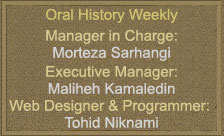| No. 576 | 7 March 2023 |
EditorialOral History of State: Importance and FunctionIn the politics, state is considered as the main and concentrated apparatus of power, and most of authors use concepts of “state” and “government” in the same meaning. Regardless of various and fashionable definitions on this phenomenon, which is sometimes called bureaucracy, having a short review of the history shows that Iranian society identified the concept of state in the modern form from the middle of Qajar Period, and experienced the modern state through the Constitutional movement.Oral History Workshop – 14Introduction and appendicesThe oral history website is going to provide the educational materials of some oral history workshops to the audience in written form. The present series has been prepared using the materials of one of these workshops. As you will see, many of the provided contents are not original or less said contents, but we have tried to provide categorized contents so that they can be used more.Memories of Morteza AlviriIn the first days of the victory of the revolution, the province of Kurdistan was in turmoil and there was a chaotic situation there. On behalf of the Peoples Mojahedin Organization of the Islamic Revolution, we have sent some people to Kurdistan to investigate the situation. We also sent an armed group there to deal with the counter-revolution. Some were also sent to Kurdistan by Mr. Rafiqdoost.Book ReviewKhoun MigozashtKhoun Migozasht is a fictional documentary of Haj Mohammad Agha Rasoulzadehs life, written by Hadi Lotfi. This biography covers a summary of the interviews done by the author with sixty people, documents review, and several hours of research. Rasoulzadeh is one of the famous fighters of the revolution in Kashan, who, after meeting Navvab Safavi, established the branch of Fadāeiyān-e Islam in Kashan. He has acted and played roles at any period. Oral History Weekly Magazine Aims and Regulations
Oral History Weekly Magazine wishes to create a suitable place for thoughts and idea development; Its main field would be “Oral History” and subjects as telling & writing memoirs, writing diaries, travelogues, chronologies, and all other subfields of history which are presented in the form of news, articles, reports, notes, interviews and memoirs can be included. There is no limitation on the length of would-be-sent materials. Mentioning the name, academic background and email is necessary. Articles with complete references and bibliography are more credited and an abstract would quite helpful. Weekly is not about to publish any material consisting insults and libels about other people or anything that brings anxiety to public opinion. Weekly can edit and translate the received materials. The published articles and materials are only the writer’s ideas and Oral History Weekly Magazine has no responsibility about their content. |
 Da (Mother) 37 The Memoirs of Seyyedeh Zahra Hoseyni Seyyedeh Zahra Hoseyni Translated from the Persian with an Introduction by Paul Sprachman Persian Version (2008) Sooreh Mehr Publishing House English Version (2014) Mazda Publishers *** I put these thoughts behind me and noticed numbers of people walking toward Mahshahr. This would be my first time there. Not knowing much about the city, I imagined it was not different from Abadan, because like Abadan it had a petrochemical complex and, of course, foreign forces had been stationed there.    |
